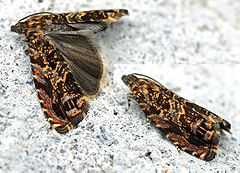Enarmonia formosana
| Cherrybark Tortrix | |
|---|---|
 | |
| Adults (image from entomart.be) | |
| Scientific classification | |
| Kingdom: | Animalia |
| Phylum: | Arthropoda |
| Class: | Insecta |
| Order: | Lepidoptera |
| Family: | Tortricidae |
| Genus: | Enarmonia |
| Species: | E. formosana |
| Binomial name | |
| Enarmonia formosana (Scopoli, 1763) | |
| Synonyms | |
|
Several, see text | |
The Cherrybark Tortrix or Cherry-bark Moth (Enarmonia formosana) is a small but colorful moth species of the family Tortricidae. It is native to all of northern and western Europe, ranging south to the Maghreb. North of the Alps its range extends eastwards to Siberia and Kazakhstan. Possibly and most likely introduced populations are found in Asia Minor and North America, respectively.
It is the type species of its genus (Enarmonia), and by extension of the tribe Enarmoniini of subfamily Olethreutinae.[1]
The wingspan is 15–19 mm. The adult moths fly from May to October in the temperate parts of the range (e.g. Belgium and The Netherlands).
The caterpillars feed on the bark of woody Rosaceae of subfamily Amygdaloideae, namely hawthorns (Crataegus), apples (Malus), cherries (Prunus) and pears (Pyrus). In particular, they have been noted[2] to forage at canker lesions.
Synonyms
Junior synonyms of this species are:[3]
- Laspeyresia woeberiana (Denis & Schiffermüller, 1775)
- Phalaena formosana Scopoli, 1763
- Pyralis woeberana Fabricius, 1787
- Tortrix ornatana Hübner, [1796-1799]
- Tortrix scriptana Thunberg & Borgström, 1784
- Tortrix woeberiana Denis & Schiffermüller, 1775
Footnotes
References
- Baixeras, J.; Brown, J. W. & Gilligan, T. M. (2009a): Online World Catalogue of the Tortricidae – Olethreutes genus account. Version 1.3.1. Retrieved 2009-JAN-20.
- Baixeras, J.; Brown, J. W. & Gilligan, T. M. (2009b): Online World Catalogue of the Tortricidae – Enarmonia formosana. Version 1.3.1. Retrieved 2010-APR-19.
- Grabe, Albert (1942): Eigenartige Geschmacksrichtungen bei Kleinschmetterlingsraupen ["Strange tastes among micromoth caterpillars"]. Zeitschrift des Wiener Entomologen-Vereins 27: 105-109 [in German]. PDF fulltext